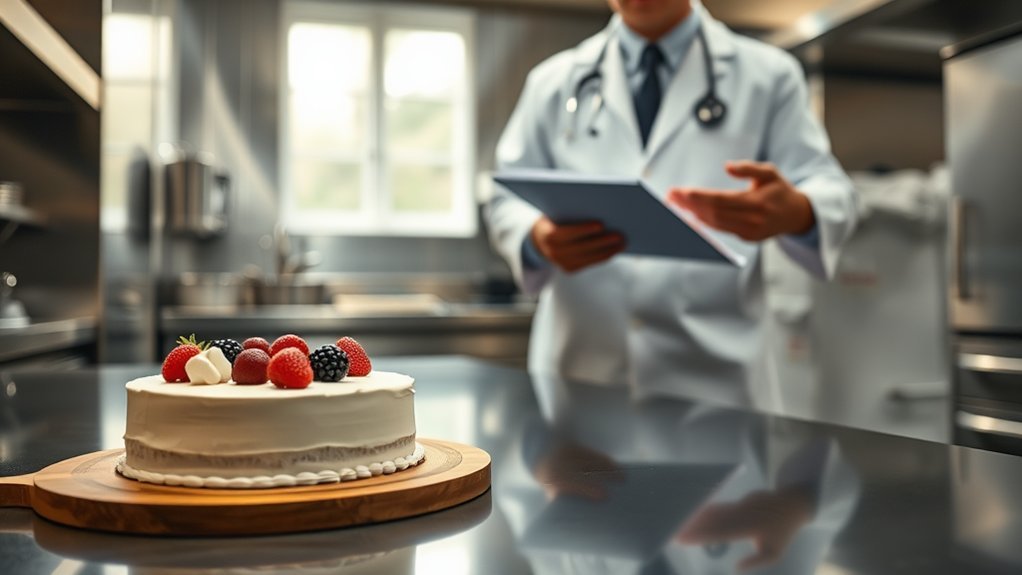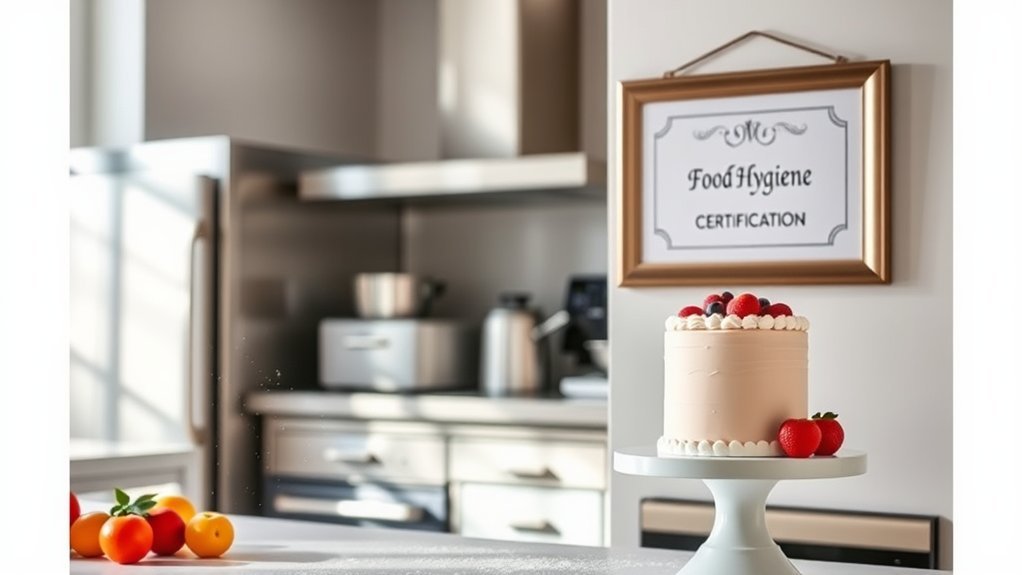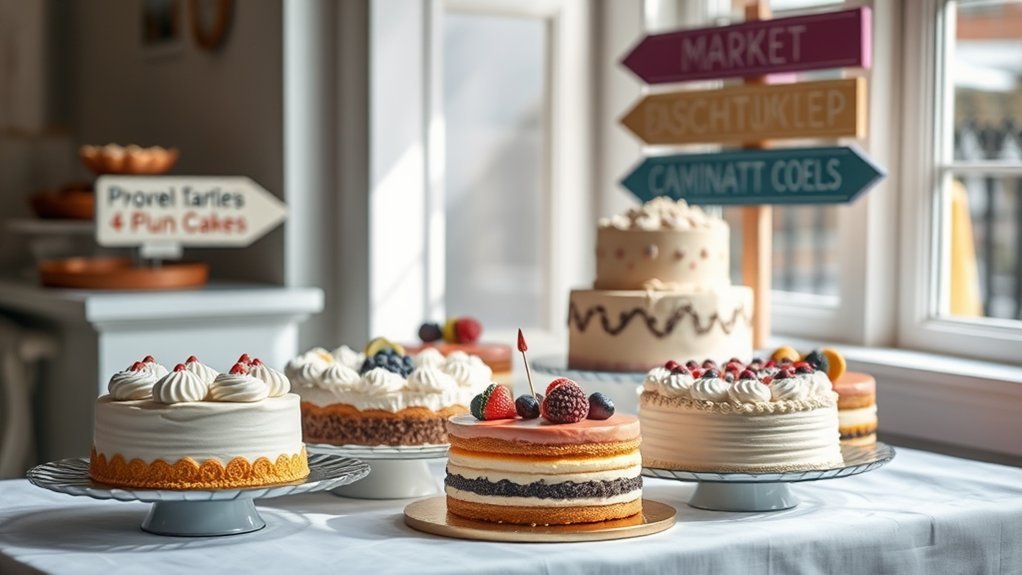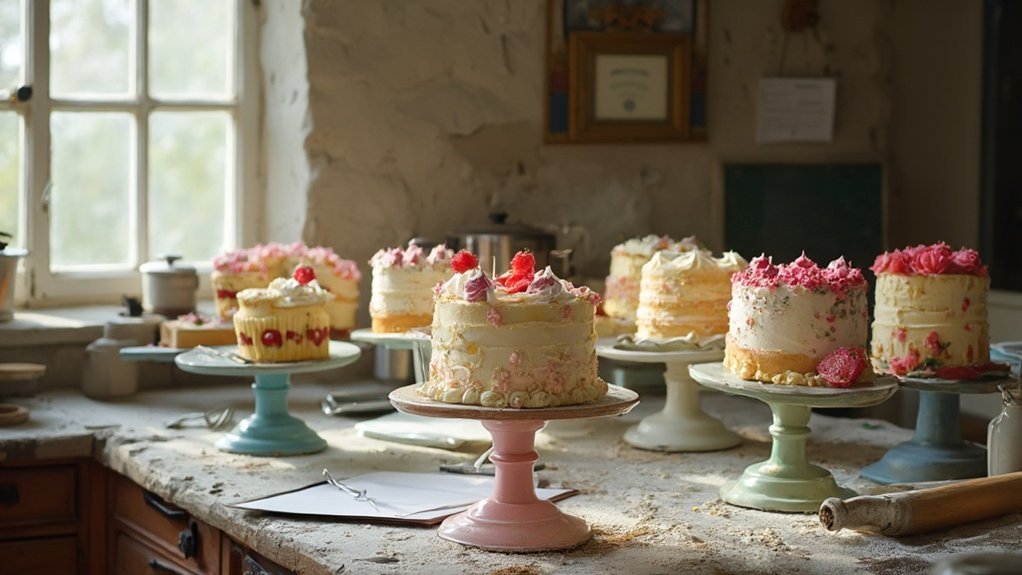Do You Need a Licence to Resell Cakes in the UK?
To resell cakes legally in the UK, you must register as a food business with your local council at least 28 days before you start. This registration ensures you comply with health and safety regulations, and your kitchen will be inspected by an Environmental Health Officer. You'll also need to have a food safety management system in place and follow proper labelling practices for your products. Understanding these requirements is key to running your cake business successfully.
Key Takeaways
Yes, if you're planning to resell cakes in the UK, you must register as a food business under Regulation (EC) 852/2004. It's essential to notify your local council at least 28 days before you start trading.
Expect an inspection from Environmental Health Officers (EHOs) to check that your kitchen meets health and safety standards. You'll also need a food safety management system in place and ensure your cakes are properly labelled to keep things transparent.
Remember, not registering can lead to legal issues, so be sure to complete your registration online—it's free and straightforward.
Understanding Food Business Registration in the UK

When starting a cake reselling business in the UK, it's crucial to register as a food business. This is a legal requirement under Article 6(2) of Regulation (EC) 852/2004 and must be done at least 28 days before you begin trading.
Whether you're operating from home or selling pre-packed cakes, registration is necessary to comply with food safety regulations. Registration as self-employed is required if selling or giving away food regularly.
The registration process is simple, free, and can be completed online. Remember, if you fail to register, you risk facing legal consequences.
Once registered, your business will be subject to inspections to ensure you meet food safety standards. It's also important to report any significant changes to your operations without delay.
The Role of Environmental Health Officers

Once you've registered your cake reselling business, Environmental Health Officers (EHOs) are crucial in ensuring your operations comply with health and safety standards. They carry out inspections to check that you're following environmental regulations and to spot any potential violations that could endanger public health. EHOs can enter your premises without prior notice to assess your sanitation practices and food handling methods. Their inspections are key to keeping consumers safe. If necessary, they can issue legal notices like Hygiene Improvement Notices to ensure compliance. EHOs play a key role in preventing environmental hazards that could impact your business and the health of your customers, particularly by ensuring that you use organic ingredients that meet strict safety standards.
Importance of Food Hygiene Certification

While food hygiene certificates aren't a legal requirement in the UK, they're incredibly useful for anyone looking to resell cakes. These certificates show your commitment to food safety, which can significantly boost customer confidence.
By completing training courses like Level 1 or Level 2, you learn vital information about hygiene practices, proper storage, and how to avoid contamination. This knowledge not only helps lower the risk of foodborne illnesses but can also lead to better food hygiene ratings during inspections. Additionally, completing Level 2 training ensures that you meet legal UK/EU training requirements, further enhancing your credibility. Furthermore, ensuring that your cakes are made from certified organic ingredients can further appeal to health-conscious consumers and demonstrate your commitment to quality.
Moreover, being certified provides proof of your dedication during food safety inspections, enhancing your credibility.
It's wise to renew your training every three years to ensure your knowledge stays up-to-date, further demonstrating your commitment to high food safety standards.
Statutory Compliance for Home-Based Cake Sellers

To sell cakes from home in the UK, you need to follow some important rules. First, register your business with your local council; this is a must. An environmental health officer will inspect your kitchen to ensure it meets health and safety standards. They'll check for cleanliness and safe practices.
You'll also need a food safety management system to help you comply with regulations. Remember, the same rules apply to home-based businesses as they do to commercial ones, just with some exceptions for scale.
When selling pre-packed cakes, make sure to label them correctly, including all ingredients and allergens. Additionally, it is crucial to ensure ingredient transparency to build trust with your customers and enhance the overall experience.
Keep your kitchen clean, control pests, and store food properly for both personal and business use. It's also important to keep written records of your suppliers and practices to stay compliant.
Essential Business Setup Considerations

Starting a cake reselling business in the UK requires careful planning to ensure compliance and success. Here are the key steps:
1. Choose Your Business Structure****: Decide whether you'll operate as a sole trader or a limited company, and register with HMRC for tax purposes.
2. Local Authority Registration: Register with your local council at least 28 days before you start trading.
3. Financial Planning: Include costs for public liability and product liability insurance to protect yourself against potential claims.
4. Equipment and Standards: Invest in specialised equipment for food preparation and ensure you meet environmental health standards.
Your kitchen must be designed to prevent cross-contamination and must pass safety inspections.
5. Waste Management: Consider registering as a waste carrier to ensure proper disposal of business waste, avoiding any regulatory issues.
Navigating Market Opportunities in the Cake Industry

To successfully explore market opportunities in the cake industry, it's essential to grasp current trends, pinpoint your unique selling points, and engage with your local community.
The rising demand for premium and healthier baked goods offers a valuable chance for your business. For example, consider incorporating gluten-free or vegan options to attract a broader customer base.
Market Trends Overview
The cake industry in the UK offers a vibrant landscape for entrepreneurs keen to tap into its trends. The market was valued at £2.67 billion in 2022 and is projected to grow to £3.09 billion by 2030, showing strong potential for growth.
Dessert cakes lead the market, but cupcakes are on the rise as consumers increasingly prefer shareable portions.
Cake flavour trends are also shifting, with a growing emphasis on premium ingredients and health-conscious choices. Customers are looking for visually appealing and innovative cakes that reflect their lifestyles, especially those inspired by global cuisines.
Unique Selling Propositions
Understanding market trends is essential for pinpointing unique selling propositions (USPs) that can make your cake business stand out.
Consider offering distinctive flavours and bespoke designs to appeal to a wider audience. Conduct detailed market research to identify your competitors' strengths and weaknesses, then focus on using high-quality ingredients to enhance your products.
Highlight specialised services like custom or wedding cakes, and ensure exceptional customer service to build loyalty. Your brand story should clearly reflect your inspiration and commitment to sustainability.
By consistently incorporating these elements into your marketing, you'll create a strong identity that connects with customers and sets your cakes apart in a competitive market.
Regularly adapt and refine your USPs to remain relevant and appealing.
Community Engagement Strategies
Engaging with your community is vital for boosting your cake business's visibility and reputation. Strong local partnerships and customer involvement can significantly contribute to your success.
Here are some effective strategies to consider:
- Social Media Engagement: Regularly share behind-the-scenes glimpses and interact with customers on platforms like Instagram and Facebook.
- Interactive Events: Organise baking workshops or tasting sessions to foster personal connections with your audience.
- Loyalty Programs: Create reward systems that encourage repeat purchases and build customer loyalty.
These strategies not only enhance your brand image but also provide valuable feedback for product improvements.
Frequently Asked Questions
Can I Sell Cakes Without a Physical Storefront?
Yes, you can sell cakes without a physical shop. Home baking and online sales are great options. Just ensure you register your business and follow food safety regulations to keep your customers safe and stay within the law. For example, consider using social media to showcase your creations and take orders directly from customers.
What Are the Penalties for Not Registering My Cake Business?
If you fail to register your cake business, you could face fines and penalties. Legal repercussions may involve prosecution, closure of your business, and harm to your reputation. For instance, if you're caught operating without the necessary permits, you could receive a hefty fine, which could eat into your profits. It's crucial to comply with regulations to ensure your business thrives.
Do I Need to Label Allergens in My Cakes?
Why put your customers' safety at risk? It's essential to label allergens in your cakes for food safety. Following allergen labelling regulations not only protects your customers but also shields your business from legal troubles and damage to your reputation. For instance, if someone with a nut allergy buys a cake without clear labelling, the consequences could be severe. It's simply not worth the risk.
How Often Will My Kitchen Be Inspected?
Your kitchen is usually inspected once a year after registration. Inspections focus on hygiene and compliance with food safety standards. They can also occur if any complaints are made about your operation.
Can I Sell Cakes at Local Markets or Events?
Selling cakes at local markets and events in the UK is a great way to share your baked goods, but you need to follow certain regulations. First, ensure you comply with hygiene standards. This means keeping your kitchen clean and safe, and your cakes properly stored. You'll also need to register your business with your local council and possibly obtain a food hygiene certificate.
Insurance is another important aspect; consider getting public liability insurance to protect yourself in case of any mishaps. By following these steps, you can confidently showcase your delicious cakes at local markets and events.
Conclusion
In the lively world of cake reselling, there are opportunities alongside responsibilities. The tempting scent of freshly baked cakes can attract customers, but adhering to food safety regulations is crucial. To sell cakes legally, you must register your food business and obtain the necessary certifications. This not only helps you sell safely but also builds trust with your customers. By combining creativity with legal requirements, you can create a cake business that is both delicious and compliant.





